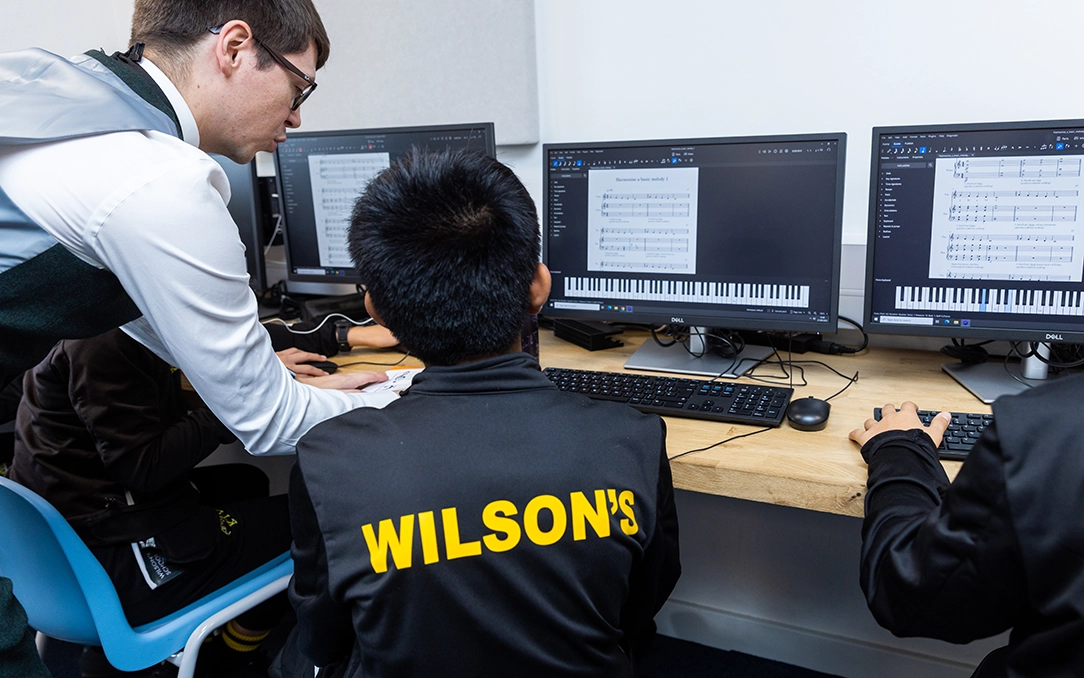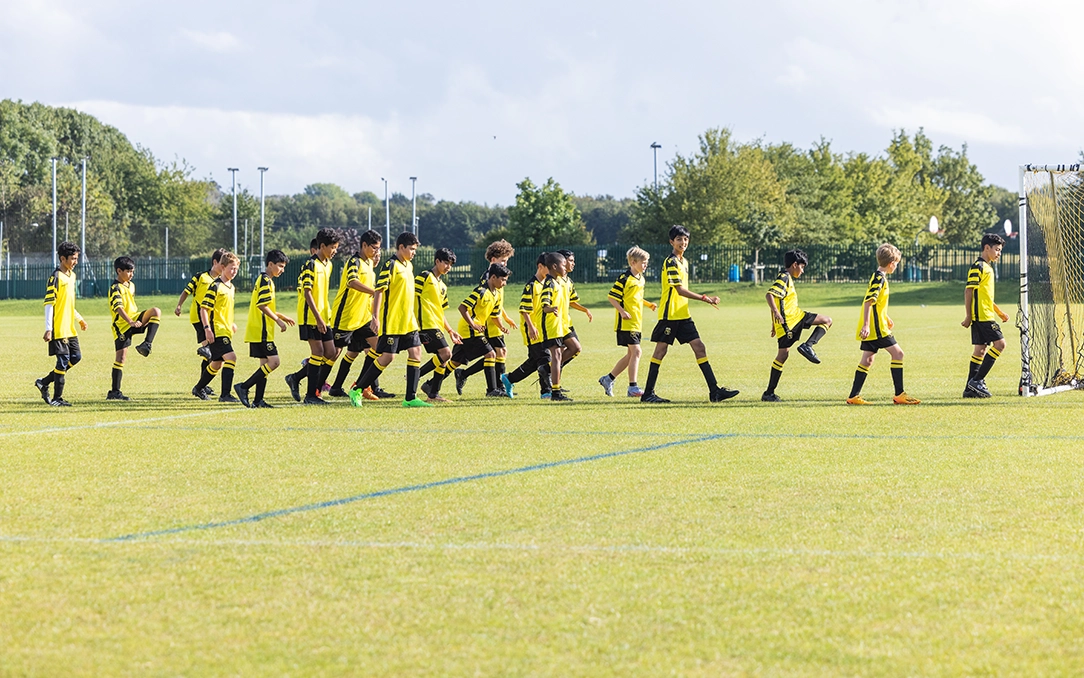Admission Criteria
Wilson’s School takes part in Sutton’s co-ordinated scheme for secondary admissions. The application procedure is in accordance with Sutton’s co-ordinated scheme.
This is a selective boys’ school with an admission number for Year 7 of 186. Boys in Year 6 of primary school in September 2024 (with a date of birth from 1 September 2013 to 31 August 2014*) and deemed to be of selective ability as determined by their performance in the entrance tests will be eligible for a place at the school.
Boys of selective ability and whose formal Education, Health & Care Plan (EHCP) names the school will be allocated a place before other applicants are considered. In this way the number of places to be offered in accordance with the oversubscription criteria set out below will be reduced by the number of boys with an EHCP that names the school.
Oversubscription Criteria
Where the number of eligible candidates for admission exceeds the number of places available, places are offered to boys in the order set out below:
- “Looked after children” or previously looked after children** by rank order of standardised score in the entrance tests;
- 14 places for boys eligible to receive Free School Meals*** by rank order of standardised score in the entrance tests;
- 9 places for boys who have demonstrated aptitude in sport (by achieving a score in the Sporting Aptitude Test above the benchmark threshold) by rank order of performance in the sporting aptitude test;
- 9 places for boys who have demonstrated aptitude in music (by achieving a score in the Music Aptitude Test above the benchmark threshold) by rank order of performance in the music aptitude test;
- Remaining places including any unallocated places under criteria 2, 3 and 4 will be allocated to boys according to their position in the rank order of standardised score in the entrance tests.
Where candidates have the same rank order under any of the oversubscription criteria above and where the admission of all would exceed the number of places available, places will be allocated in the following order:
- to candidates whose permanent home address**** is within the London Borough of Sutton in the order of the distance of their home address (with those living closest being given priority) measured in a straight line from the main front door of Wilson’s School;
- to those candidates who live elsewhere in the order of the distance of their home address (with those living closest being given priority) measured in a straight line from the main front door of Wilson's School.
In the event that candidates have the same rank order and cannot be separated by distance, the applications will be determined by a random ballot supervised by an independent person.
Notes
* Education out of normal (chronological) age group: Children are normally educated in school with others of their age group; however, in exceptional circumstances parents/carers may seek a place outside of their son’s normal age group. The decision of the admissions authority will be made on the basis of the circumstances of each case and in the best interests of the child concerned. This will include taking account of the parents’ views; information about the child’s academic, social and emotional development; where relevant, their medical history and the views of a medical professional; whether they have previously been educated out of their normal age group. Parents requesting admission of their child outside their normal age group must note this when registering their child to sit the SET and will be required to supply supporting evidence before the registration can be completed. In circumstances where a child is summer born (birth date between 1 April and 31 August) and where parents delayed the child’s entry to reception and the child has remained out of cohort for their entire primary attendance, provided supporting evidence is supplied, the admission authority will accept the application. Parents will be informed of the outcome of their request prior to the entrance tests. The SET can only be taken once by a candidate i.e. an out of normal age group candidate cannot sit the test a second time.
** A child will meet this criteria if they are a “looked after child” or a child who was previously looked after but immediately after being looked after became subject to an adoption, child arrangements, or special guardianship order including those who appear to the admission authority to have been in state care outside of England and ceased to be in state care as a result of being adopted. A “looked after child” is a child who is (a) in the care of a local authority, or (b) being provided with accommodation by a local authority in the exercise of their social services functions (see the definition in Section 22(1) of the Children Act 1989). Appropriate evidence of looked after status will be required.
*** Children eligible to receive Free School Meals (FSM) are those who are eligible for income related FSM at the time of registration for the Selective Eligibility Test (SET). If a candidate is successful in the entrance tests the school will verify with the candidate’s primary school if the candidate is/was receiving income related FSM at the time of registration for the SET or, if necessary, other evidence of eligibility for income related FSM will be sought from the child’s parent/carer. The school reserves the right to withdraw the offer of a place if the offer has been made on the basis of an incorrect, fraudulent or misleading application. Parents/carers of children attracting FSM must have ticked the FSM box when registering their child for the SET. Any alterations to this box cannot be made after the closing date for registrations.
**** The permanent home address is where the child normally lives and excludes any business address, relative, friend or carer/child-minder’s address, use of a rented or second owned property on a temporary basis which gains advantage or use of a local address whilst the child lives overseas. Where a child lives with parents with shared parental responsibility, each for part of a week, the address where the child lives is determined using a joint declaration from the parents stating the pattern of residence. If a child’s residence is split equally between both parents, then parents will be asked to determine which residential address should be used for the purpose of admission to school. If no joint declaration is received and the residence is split equally by the closing date for applications, the home address will be determined to be the address where the child is registered with the doctor. However, all evidence will be taken into account. If the residence is not split equally between both parents, then the address used will be the address where the child spends the majority of the school week. In some cases, where distance is a relevant factor in admission decisions, a different address may be used if a family unit owns or has access to another property. All school admission applications for school places are subject to address checks to ensure school places are allocated fairly and in accordance with published admission arrangements. These checks will be conducted by the home Local Authority; where a fraudulent address or an address of convenience are found to have been used, the application and any subsequent offer may be withdrawn. Applicants living outside of England may only submit an application if they have a linked address within the Local Authority area, and documentary evidence must be supplied to show they will return to the address prior to the September in the year of entry; this address must not be an address of convenience. If parents/carers wish to discuss their circumstances prior to making their application, they should contact their home Local Authority. All distances will be measured as the crow flies from the main entrance of the child’s home to the main entrance of the school using a computerised Geographical Information System maintained by the London Borough of Sutton’s School Admissions Team.
Wilson’s School takes part in Sutton’s co-ordinated scheme for secondary admissions. The application procedure is in accordance with Sutton’s co-ordinated scheme.
This is a selective boys’ school with an admission number for Year 7 of 186. Boys in Year 6 of primary school in September 2025 (with a date of birth from 1 September 2014 to 31 August 2015*) and deemed to be of selective ability as determined by their performance in the entrance tests will be eligible for a place at the school.
Boys of selective ability and whose formal Education, Health & Care Plan (EHCP) names the school will be allocated a place before other applicants are considered. In this way the number of places to be offered in accordance with the oversubscription criteria set out below will be reduced by the number of boys with an EHCP that names the school.
Oversubscription Criteria
Where the number of eligible candidates for admission exceeds the number of places available, places are offered to boys in the order set out below:
- “Looked after children” or previously looked after children** by rank order of standardised score in the entrance tests;
- 14 places for boys eligible to receive Free School Meals*** by rank order of standardised score in the entrance tests;
- 9 places for boys who have demonstrated aptitude in sport (by achieving a score in the Sporting Aptitude Test above the benchmark threshold) by rank order of performance in the sporting aptitude test;
- 9 places for boys who have demonstrated aptitude in music (by achieving a score in the Music Aptitude Test above the benchmark threshold) by rank order of performance in the music aptitude test;
- Remaining places including any unallocated places under criteria 2, 3 and 4 will be allocated to boys according to their position in the rank order of standardised score in the entrance tests.
Where candidates have the same rank order under any of the oversubscription criteria above and where the admission of all would exceed the number of places available, places will be allocated in the following order:
- to candidates whose permanent home address**** is within the London Borough of Sutton in the order of the distance of their home address (with those living closest being given priority) measured in a straight line from the main front door of Wilson’s School; then
- to those candidates who live elsewhere in the order of the distance of their home address (with those living closest being given priority) measured in a straight line from the main front door of Wilson's School.
In the event that candidates have the same rank order and cannot be separated by distance, the applications will be determined by a random ballot supervised by an independent person.
Notes
* Education out of normal (chronological) age group: Children are normally educated in school with others of their age group; however, in exceptional circumstances parents/carers may seek a place outside of their son’s normal age group. The decision of the admissions authority will be made on the basis of the circumstances of each case and in the best interests of the child concerned. This will include taking account of the parents’ views; information about the child’s academic, social and emotional development; where relevant, their medical history and the views of a medical professional; whether they have previously been educated out of their normal age group. Parents requesting admission of their child outside their normal age group must note this when registering their child to sit the SET and will be required to supply supporting evidence before the registration can be completed. In circumstances where a child is summer born (birth date between 1 April and 31 August) and where parents delayed the child’s entry to reception and the child has remained out of cohort for their entire primary attendance, provided supporting evidence is supplied, the admission authority will accept the application. Parents will be informed of the outcome of their request prior to the entrance tests. The SET can only be taken once by a candidate i.e. an out of normal age group candidate cannot sit the test a second time.
** A child will meet this criteria if they are a “looked after child” or a child who was previously looked after but immediately after being looked after became subject to an adoption, child arrangements, or special guardianship order including those who appear to the admission authority to have been in state care outside of England and ceased to be in state care as a result of being adopted. A “looked after child” is a child who is (a) in the care of a local authority, or (b) being provided with accommodation by a local authority in the exercise of their social services functions (see the definition in Section 22(1) of the Children Act 1989). Appropriate evidence of looked after status will be required.
*** Children eligible to receive Free School Meals (FSM) are those who are eligible for income related FSM at the time of registration for the Selective Eligibility Test (SET). If a candidate is successful in the entrance tests the school will verify with the candidate’s primary school if the candidate is/was receiving income related FSM at the time of registration for the SET or, if necessary, other evidence of eligibility for income related FSM will be sought from the child’s parent/carer. The school reserves the right to withdraw the offer of a place if the offer has been made on the basis of an incorrect, fraudulent or misleading application. Parents/carers of children attracting FSM must have ticked the FSM box when registering their child for the SET. Any alterations to this box cannot be made after the closing date for registrations.
**** The permanent home address is where the child normally lives and excludes any business address, relative, friend or carer/child-minder’s address, use of a rented or second owned property on a temporary basis which gains advantage or use of a local address whilst the child lives overseas. Where a child lives with parents with shared parental responsibility, each for part of a week, the address where the child lives is determined using a joint declaration from the parents stating the pattern of residence. If a child’s residence is split equally between both parents, then parents will be asked to determine which residential address should be used for the purpose of admission to school. If no joint declaration is received and the residence is split equally by the closing date for applications, the home address will be determined to be the address where the child is registered with the doctor. However, all evidence will be taken into account. If the residence is not split equally between both parents, then the address used will be the address where the child spends the majority of the school week. In some cases, where distance is a relevant factor in admission decisions, a different address may be used if a family unit owns or has access to another property. All school admission applications for school places are subject to address checks to ensure school places are allocated fairly and in accordance with published admission arrangements. These checks will be conducted by the home Local Authority; where a fraudulent address or an address of convenience are found to have been used, the application and any subsequent offer may be withdrawn. Applicants living outside of England may only submit an application if they have a linked address within the Local Authority area, and documentary evidence must be supplied to show they will return to the address prior to the September in the year of entry; this address must not be an address of convenience. If parents/carers wish to discuss their circumstances prior to making their application, they should contact their home Local Authority. All distances will be measured as the crow flies from the main entrance of the child’s home to the main entrance of the school using a computerised Geographical Information System maintained by the London Borough of Sutton’s School Admissions Team.




